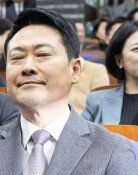A Beautiful Will
The property-donating movement, which encourages people to return property accumulated throughout their lives to society, is spreading across the country.
The movement is accelerated with a belief that since wealth is accumulated in the process of social productions and transactions, it is natural for some to return some portions of wealth and instead hand over the morality and integrity to their off-springs.
Experts feel that such a movement will play a critical role in rooting out conflicts and criminals in regards to leaving property that has been spotlighted recent years as a serious social problem.
According to a statement of a Not Leaving Property group announced yesterday, the number of the groups members has significantly increased recently. The association that was established with the purpose of encouraging property returns to society and discouraging property succession to bereaved families first started with the participation of the late Reverend Han Kyung-jik, Son Bong-ho, a professor at Seoul National University (and current president of Dongduk Womens University), and Kim Kyung-rae, the general secretary of the Council for Celebrating the Centennial Year of Christianity.
The number of new participants in the association has gradually increased since then, by 46 in 2000, 37 in 2001, 42 in 2002, 66 in 2003, and 85 in 2004. As of December 2004, the number of its members was as many as 864.
Those who express their willingness to participate in the movement can have membership after signing a statement stating that they agree with the initiative of this movement. The statement says: A third of my property will go to my offspring, another third of it will go to poor people around me, and the last third will goes to unknown poor people like those who are accommodated in social welfare facilities. The group does not publicize its list of members, saying, This is a promise with oneself, and therefore, it is not necessary that everybody knows it.
About 30 members kept their promise after they passed away. For example, one president of a glass manufacturing company who passed away eight years ago donated all his property to social welfare organizations, leaving only one house to his wife, said Kim Kyung-rae, general secretary of the Council for Celebrating the Centennial Year of Christianity
Meanwhile, life insurance packages that provide death benefits to designated organizations are also popular these days,
The number of subscribers to the Insurance for Love plan offered by ING Life Korea has sharply increased by 219 in 2001, 472 in 2002, 1,761 in 2003, and 2,700 in 2004. The benefits of this insurance plan will go to charitable organizations instead of family members when its subscribers pass away.
Since now, two cases have been recorded, with death benefits sent to the United Nations Childrens Fund (UNICEF) and the Korean Association for Children with Leukemia and Cancer (KACLC), respectively.
Reverend Choi Il-do from Da-il Community, a subscriber to Insurance for Love, said, I am very pleased that we have an insurance policy that allows people, who are not necessarily rich, to help others by being frugal in their everyday lives.
The Korean Committee for UNICEF is also running a property-donation program to help children living in developing countries.
Park Soon, director of the department for finding sponsors of the committee, said, It is absolutely wrong that only rich men can contribute their property to society. Rather, when you donate your property to others, you can be a rich man.
Lee Kyung-hyun, director of the donation consulting team of Beautiful Foundation, which has run a one percent sharing program since 2000, said, This movement should settle into a social normal practice rather than a temporary event caused by the determination of some individuals.







